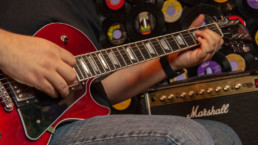Guitar Practice: Conscious Repetition
“Don’t practice till you get it right, practice till you can’t get it wrong”.
It’s well-intentioned advice, but it might give you an incomplete picture. Many people will read that sentence as, “do it over and over until it’s perfect”. But playing well doesn’t come from repetition alone.
The best players put in their time out in the proverbial woodshed, and you can be sure they got their reps in. But that’s not what makes them the best. It’s not talent either, because plenty of talented people stop growing when they reach the limits of their gift.
The best players are dynamic in that they make the music “speak”.
Think of every note as a spoken word, and every phrase a sentence. If you’ve ever heard two different actors recite the same lines with two very different results, you know that delivery is really what drives the meaning home. So accurately hitting a target is only part of the picture.
The purpose of repetitive practice is to ingrain a movement into what we call muscle memory. Muscle memory doesn’t require conscious thought but an unconscious trigger. (You don’t have to think about putting your foot on the brake pedal when you need to stop your car). When we perform a movement repeatedly, the brain reinforces the specific pathways it requires, creating a kind of neural superhighway. This is happening at the speed of electricity, so it’s impossible to get ahead of it consciously. But like a Porsche on the Autobahn, your body can respond like the finely tuned machine it is.

The subtleties of articulation and dynamics that bring music to life ARE muscular as well.
A slide feels different from a hammer-on and requires a different movement. Playing louder or softer requires a change in the intensity of your attack. So all musical playing is technical, in that you have to perform an action to get the effect. But expressive actions should be conscious, at least potentially. You might have practiced a crescendo carefully to make sure you build your volume at the right speed, but your musical mind still has to be engaged to execute it well.
Expressive are thoughts and gestures. These can be memorized just like anything else, but they should never be automatic. Instead, your goal should be complete familiarity with the music. You know exactly what needs to happen in that moment and you have the technical ability to execute the move. But the action itself is a choice.
If you’ve ever jumped off a high diving board, you might remember what that first time felt like. Once your feet left the board, how you landed was up to gravity and chance. But over time, you can learn to control the dive. Your time in the air isn’t just free-fall, but the predictable result of good form and focused attention. Guitar is no different.

No amount of repetitive practice is going to make you an expressive player without directed control.
The muscles may have been prepared and that neural superhighway paved and ready. But the thought is what delivers the message to the fingers.
So the goal of repetition is not to become automatic. The goal of repetition is to become so familiar with the music that your hands AND mind know where you are at all times. That means engaged practice, paying attention to detail. Most of all, it means your practice is never mindless. Don’t repeat casual sloppiness. If you can’t execute something cleanly, take a closer look and find out why. Odds are good that the problem might be one of missing or incomplete data. If you don’t know what’s going wrong other than the fact that it’s not working, repetition alone will not solve the problem.
Does your technical practice need a reset? This course is designed to do just that.
Interested in learning to solo on guitar? Check out JamPlay.com. JamPlay has over 450 guitar courses from 120+ instructors, and online guitar lessons tailored to every skill level, music genre, and playing style. Click here to learn more.
Dave Isaacs has established himself as a guitar teacher extraordinaire, having built a strong set of educational curriculums for beginner, intermediate, and advanced guitar players alike. Dave shares his expertise largely through video platforms, but also through his thoughtful writing. You can take guitar lessons from Dave Isaacs via his comprehensive video guitar courses on JamPlay.com.
Share this
Become a JamPlay member for unlimited access to 7000+ guitar lessons and 120+ artists and instructors. View membership plans ›




